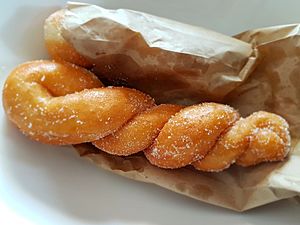Twisted doughnut facts for kids

Filipino shakoy
|
|
| Type | Doughnut |
|---|---|
| Course | Snack |
Twisted doughnuts are yummy snacks made from dough. They are often shaped like a twist or braid. These treats are usually deep-fried until golden brown. You can find them in many countries around the world. Each place has its own special name and way of making them.
For example, in China, they are called mahua. In Korea, they are known as kkwabaegi. The Philippines has shakoy and pilipit. Japan calls its version sakubei. These delicious pastries are a popular snack or dessert.
Contents
Twisted Doughnuts Around the World
China's Mahua
| Twisted doughnut | |||||||||||||||
|---|---|---|---|---|---|---|---|---|---|---|---|---|---|---|---|
| Chinese | 麻花 | ||||||||||||||
| Traditional Chinese | 麻花 | ||||||||||||||
| Simplified Chinese | 麻花 | ||||||||||||||
|
|||||||||||||||
In Mainland China and Taiwan, twisted doughnuts are called mahua. These are traditional fried desserts. They have been enjoyed for thousands of years! The first mahua came from the city of Tianjin.
Mahua are usually made from flour, sugar, and cooking oil. Sometimes, people add salt, honey, nuts, or other spices. The dough is twisted into a braided shape. Then, it is fried in peanut oil. Some mahua are crispy on the outside and soft inside. Others are crunchy all the way through.
Italy's Treccia
In Italy, a twisted doughnut is known as treccia. This Italian treat is sometimes filled with sweet pastry cream. It can also be covered with sugar, chocolate, or other tasty toppings. It's a delightful dessert or snack.
Japan's Sakubei
In Japan, there's a similar food called sakubei. This dish came from China during the Nara period. It was a type of noodle that looked like a rope. Some people even say it was an early form of udon and somen noodles!
Sakubei was also called muginawa. It became less common by the Edo period. However, you can still find similar sweets in places like Nara. These modern versions often use rice flour instead of wheat flour.
Korea's Kkwabaegi
| Korean name | |
| Hangul |
꽈배기
|
|---|---|
| Revised Romanization | kkwabaegi |
| McCune–Reischauer | kkwabaegi |
| IPA | [k͈wa.bɛ.ɡi] |
In Korea, twisted doughnuts are called kkwabaegi. These doughnuts are mildly sweet and very fluffy. They are made from dough that uses yeast and wheat or glutinous rice flour. Sometimes, melted butter is added too.
After being deep-fried, kkwabaegi are often coated with sugar and cinnamon powder. They are a very popular snack, especially for kids after school.
Philippines' Shakoy and Pilipit
In the Philippines, twisted doughnuts have different names. In the Visayas Islands, they are called shakoy or siyakoy. In the northern Philippines, they are known as lubid-lubid. The dough is twisted into a rope shape before frying.
Shakoy are made much like other doughnuts. Some versions use glutinous rice flour. They can be soft and fluffy, or sticky and chewy. If they are hard and crunchy, they are called pilipit. These treats are usually sprinkled with white sugar. Sometimes, they have sesame seeds or caramelized sugar on top.
Vietnam's Twisted Doughnuts
In Vietnam, this twisted treat has many names. Some common names include Bánh Quẩy Thừng, which means "twisted-rope doughnut". Other names are bánh vặn (twisted doughnut) and bánh quẩy đường (sweet twisted doughnut). These names show how popular and varied this snack is in Vietnam.
 | Aaron Henry |
 | T. R. M. Howard |
 | Jesse Jackson |

